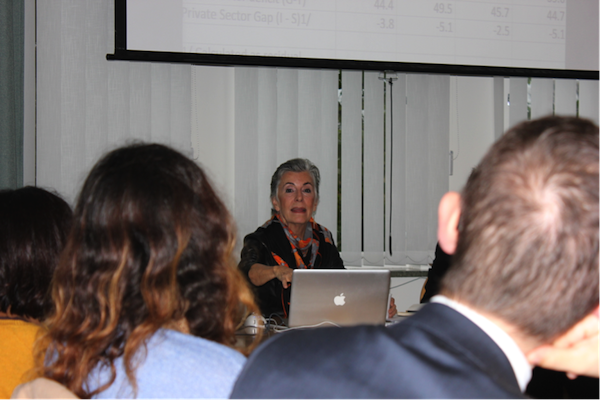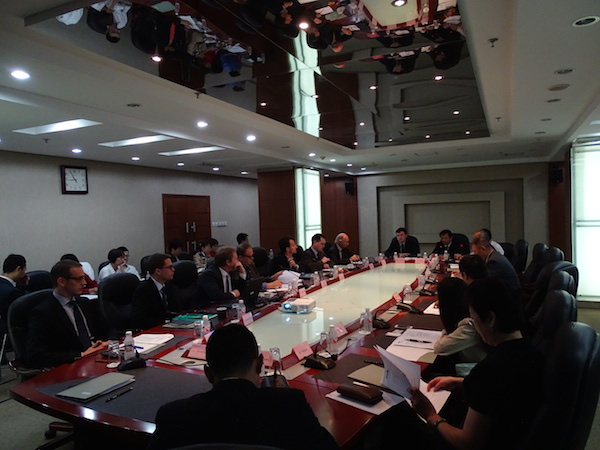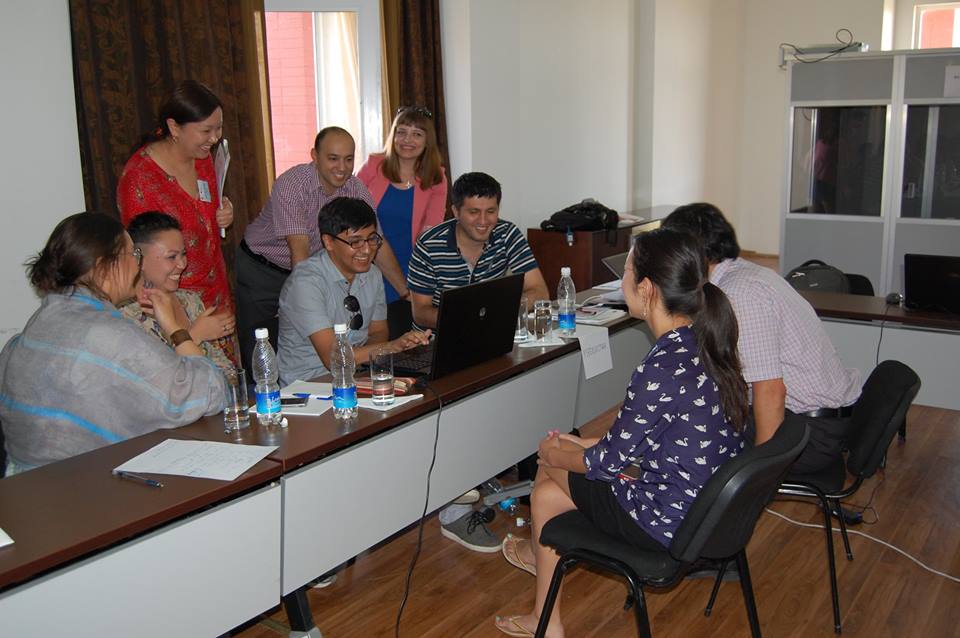SIPRI co-hosts conference on Central Asia
On 12 June, SIPRI and the International Tax and Investment Center hosted a morning conference in Stockholm on the theme ‘Central Asia in a Changing Global Order’.
On 12 June, SIPRI and the International Tax and Investment Center hosted a morning conference in Stockholm on the theme ‘Central Asia in a Changing Global Order’.
On 6–7 March, SIPRI hosted a symposium to explore different perspectives on and opportunities for strengthening security cooperation between the Nordic countries and Japan.
On 8–9 September, SIPRI and the Middle East Council on Global Affairs (ME Council) co-hosted a workshop on the theme ‘Asia and the Middle East Beyond Energy: Towards Security and Defense Cooperation’.
SIPRI and JIIA co-hosted an expert workshop on ‘Examining Security Dilemma Dynamics behind Naval Build-up in the Indo-Pacific’.
On 29 September, SIPRI hosted a hybrid workshop to examine how the European Union (EU) and Japan approach ‘de-risking’. In recent years, geopolitical tensions and great power competition have led many countries to adopt and implement stricter measures to safeguard their economies from political pressure and supply-chain disruptions—an approach that has come to be known as de-risking.
On 2–3 November 2022, SIPRI, in cooperation with the Observer Research Foundation (ORF) America, hosted a closed-door, in-person expert workshop on ‘Cyber Postures and Dynamics: China, Russia, United States and Europe’ in Washington, DC.
On 28–29 September 2022, SIPRI hosted an online expert workshop on ‘Promoting a Free and Open Indo-Pacific: Naval Incident Management in Asia and Europe’.
On 22 September, SIPRI hosted an online roundtable discussion on the theme ‘China’s Afghan Footprint in a Post-US Withdrawal Environment’. The online event convened experts from Afghanistan, China and Europe to discuss and explore whether and how China might play a constructive role in a Taliban-led Afghanistan, and propose recommendations for regional, economic and political stability.
On 12 November, SIPRI hosted an online roundtable discussion on the theme ‘Chinese ODA in Africa and Implications for the International Aid Architecture’.
On 18 May, SIPRI hosted a webinar in connection with the launch of the SIPRI Policy Paper ‘China–EU Connectivity in an Era of Geopolitical Competition’.
SIPRI is pleased to launch a new video series on the topic of European Union (EU)–China relations and the role of connectivity, featuring interviews with European and Chinese experts.
On 12 November, SIPRI hosted a virtual dialogue on the theme of ‘Towards Harmonized Approaches to Financing Green Development’.
On 2–3 September, SIPRI and the China Institute of International Studies (CIIS) co-hosted a two-day webinar series on ‘EU–China Relations in an Era of Connectivity’.
On 13–15 November, a SIPRI delegation led by Dan Smith, SIPRI Director, visited several centres of research in China for a series of events and lectures.
On 17–18 October, SIPRI held the first of two workshops on ‘China–European Union (EU) Relations in an Era of Connectivity’.
On 22–23 May, SIPRI, in cooperation with the Friedrich-Ebert-Stiftung Kenya Office (FES Kenya) and the Pan African Climate Justice Alliance (PACJA), convened a two-day workshop in Nairobi, Kenya, to seek ways of better integrating the risks posed by climate change into peace and security processes in the Horn of Africa.
SIPRI has expanded its research on security issues in the Horn of Africa by launching a new series of publications investigating major questions for the future security and stability of the region. Notably, it highlights the increasing importance of geopolitical, commercial and military competition as the driver of foreign military deployments to the region.
On 7–8 February, SIPRI, in cooperation with India’s National Maritime Foundation and the Delegation of the European Union (EU) to India, organized a workshop in Delhi entitled ‘Securing the Maritime Commons: India, the European Union and Indian Ocean Maritime Security’.
SIPRI, in cooperation with the FES, presented the findings of its new report on the sea-based component of the Belt and Road Initiative (BRI) in launch events for key stakeholders throughout Asia and Europe.
SIPRI is pleased to announce the launch of a new report on the security implications of China’s 21st Century Maritime Silk Road (the Road).The report examines the impact of the two most strategic maritime spaces that the initiative traverses: the South China Sea and the Indian Ocean Region. It assesses the implications of the project for European Union (EU) foreign and security interests, but should also be relevant to all stakeholders of the Road.
On 22-23 February, SIPRI and the Friedrich-Ebert-Stiftung (FES) hosted the second of three workshops for a joint project that examines the security implications of the 21st Century Maritime Silk Road (Road) in Yangon, Myanmar.
SIPRI is proud to e-launch the Chinese-language translation of SIPRI Yearbook 2016. Download your free copy here. [斯德哥尔摩国际和平研究所(SIPRI)将在线提供《SIPRI年鉴2016:军控·裁军和国际安全》的中文电子版。请点击这里免费下载。]
SIPRI and the Friedrich-Ebert-Stiftung (FES) will continue their cooperation on researching China’s Belt and Road Initiative (BRI) from a security perspective.
SIPRI co-hosted the third annual Life in Kyrgyzstan (LiK) Conference in Bishkek on 12–13 October 2017. During the two-days, the conference was attended by more than 110 participants, representing government agencies, academia, civil society, international organizations, independent researchers and the private sector.
On 11–18 June, SIPRI and the University of Central Asia’s Institute of Public Policy and Administration (UCA) hosted a summer school titled ‘Social Cohesion: Concept, Implementation and Evaluation’.
SIPRI is pleased to announce its latest Policy Paper looking at Chinese–Russian cooperation in the Arctic.
SIPRI researchers Jiayi Zhou and Richard Ghiasy presented the SIPRI – Friedrich-Ebert-Stiftung (FES) report ‘The Silk Road Economic Belt: Security Implications and EU-China Cooperation Prospects’ in Tbilisi, Georgia.
SIPRI Senior Researcher Dr Damir Esenaliev presented work on peacebuilding impact evaluation and social cohesion at four events in Washington D.C.
SIPRI makes available online access to the Chinese translation of the SIPRI Yearbooks from 2011-2015.
SIPRI is pleased to announce the publication of an edited volume of essays, entitled ‘China–Russia Relations and Regional Dynamics: From Pivots to Peripheral Diplomacy’, based on participant contributions to SIPRI’s expert workshop in January 2017 on the theme of Russia-China rapprochement.
SIPRI announces a new publication, entitled ‘China’s engagement of North Korea: Challenges and opportunities for Europe’.
On 17 and 18 January, SIPRI held a workshop entitled ‘Russia-China Rapprochement and its Impact on Asia and Europe’. More than 70 participants were present.
SIPRI is pleased to announce the publication of the report 'The Silk Road Economic Belt: Considering Security Implications and EU–China Cooperation Prospects'.
SIPRI co-hosted the final of a series of five regional workshops for the Silk Road Economic Belt - Seeking Common Security Interests between the EU and China project in Brussels, Belgium.
Dr Lora Saalman presented her work on deterrence frameworks in cyberspace at the 15th PIIC Beijing Seminar on International Security.
SIPRI researchers were invited to 18 universities and research centres across China to preent SIPRI Yearbook 2016 and the Chinese translation of SIPRI Yearbook 2015.
SIPRI co-hosted a workshop on the compatibility of the Silk Road Economic Belt with Russian national security interests.
SIPRI researchers Richard Ghiasy and Jiayi Zhou co-hosted the third of a series of five workshops for the Silk Road Economic Belt—Seeking Common Security Interests between the EU and China project.
Richard Ghiasy, researcher in SIPRI's Armed Conflict and Conflict Management Programme, contributed to a series of 'track 2' dialogues between the USA and China on Afghanistan and Pakistan.
SIPRI researchers Dr Lora Saalman, Richard Ghiasy and Jiayi Zhou participated in two events on China and Central Asia held in Astana, Kazakhstan.
Stockholm International Peace Research Institute (SIPRI) has completed the project 'Gender and Employment in Central Asia', implemented during 2013–2015 with the University of Central Asia, Hannover University, the International Security and Development Centre (ISDC), Vanderbilt University and Manchester University.
SIPRI researchers Richard Ghiasy and Jiayi Zhou, together with Henrik Hallgren from the International Council of Swedish Industry (NIR), presented their report ‘Afghanistan’s Private Sector: Status and ways forward’ at four separate events across three continents.
The events were held between September and November and took place in Brussels, Washington D.C., Stockholm and Kabul. The Swedish Ambassador to Afghanistan, Anders Sjöberg, hosted the final event in Kabul, which attracted a diverse audience including private sector actors and representatives from the EU Delegation.
SIPRI co-hosted the inaugural Life in Kyrgyzstan Conference in Bishkek from 1-2 October 2015 together with the University of Central Asia (UCA), the International Security and Development Center (ISDC), and the World Bank. During the two-day conference, more than 40 international and regional speakers gathered to exchange research and promote evidence-based policymaking.
 On 24 October SIPRI hosted a lecture by Dr Graciana del Castillo, entitled 'From failed interventions to a new economic strategy for Afghanistan'.
On 24 October SIPRI hosted a lecture by Dr Graciana del Castillo, entitled 'From failed interventions to a new economic strategy for Afghanistan'.

On 12 September SIPRI and the China Institutes Of Contemporary International Relations (CICIR) co-hosted a conference in Beijing on Chinese and European experiences of protecting their nationals and interests in Africa.

From 13–25 July SIPRI and the University of Central Asia's Institute of Public Policy and Administration (IPPA) conducted a summer school on 'Labor Markets in Central Asia' in Issyk Kul, Kyrgyzstan.
The summer school was a part of the 'Gender and Employment in Central Asia' research project, which is funded by the IZA/DFID Growth and Labour Markets in Low Income Countries Programme (GLM | LIC).
SIPRI and the University of Central Asia will participate as research partners in a new research project entitled Social Cohesion Through Community-Based Development.
The project, which is funded by the World Bank and the Aga Khan Foundation, will be carried out in Kyrgyzstan with a budget of $3 million over four years, of which SIPRI will receive $605 000.
SIPRI is pleased to announce the publication of Relations between Afghanistan and Central Asian states after 2014: Incentives, Constraints and Prospects, by Dr Nargis Kassenova.
In July 2014 SIPRI and the Institute of Public Policy and Administration of the University of Central Asia (UCA) will offer a Summer School programme in Kyrgyzstan entitled ‘Labour Markets in Central Asia’.
The objective of the Summer School is to teach the basics of labour economics, discuss a range of labour market issues in Central Asia and beyond, and introduce relevant research and policy evaluation methods.
On 27 January in Kabul, Afghanistan, SIPRI held a roundtable discussion, entitled 'Security in Afghanistan and its Neighbourhood: the Regional Dimension of Stability after Transition'.
 On 18 October SIPRI, in collaboration with the China Center for Contemporary World Studies (CCCWS), organized a one-day workshop in Beijing entitled 'Security in Afghanistan and its Neighbourhood: The Regional Dimension of Stability after Transition’.
On 18 October SIPRI, in collaboration with the China Center for Contemporary World Studies (CCCWS), organized a one-day workshop in Beijing entitled 'Security in Afghanistan and its Neighbourhood: The Regional Dimension of Stability after Transition’.
The Chinese translation of SIPRI Yearbook 2012 was launched yesterday at an event in Beijing. The book was launched by Li Hong, Vice-President and Secretary General of the China Arms Control and Disarmament Association (which carried out the translation); Minister Salome Meyer, Deputy Head of Mission with the Embassy of Switzerland to China; and Mathieu Duchâtel, Head of SIPRI's China Project.
On 16 May SIPRI held an expert seminar in Brussels on stabilizing Afghanistan and its neighbourhood and the challenge for Europe.
The event was attended by approximately 35 participants from the local policy making community, who were informed about the outcomes of the Wider Central Asia Initiative, a SIPRI project aimed at promoting and facilitating dialogue among the main stakeholders in Afghanistan's future.
On 18–19 April SIPRI hosted a two-day conference on China's foreign and security policy during the decade in power of Hu Jintao (2002–12).
Göran Lennmarker, Chairman of the SIPRI Governing Board, gave welcoming remarks and the conference was introduced by Mathieu Duchâtel, Head of SIPRI's China Project.
Dr. Yongsoo Hwang will discuss North Korea's key nuclear installations and their role in nuclear testing.
This event will feature discussions and knowledge-sharing on impact evaluation practices, research methodologies and experiences in policy influence in fragile states.
HE Hassan Wirajuda, former Foreign Minister of Indonesia, will discuss the impact of The Hague’s ruling on the South China Sea and explore its wider implications for South East Asia.
To launch the new report on the Silk Road Economic Belt, SIPRI Researchers in the China and Global Security Programme will participate in a discussion event in Stockholm.
In the wake of North Korea's fourth and fifth nuclear tests in 2016 and follow-on resolutions from the United Nations, SIPRI will co-host the workshop 'Challenges and Prospects for Economic Development in the DPRK' on 20 September.
A discussion on the state of the domestic and foreign dynamics shaping Afghanistan’s prospects for achieving peace and stability.
Stockholm International Peace Research Institute (SIPRI) together with the University of Central Asia’s Institute of Public Policy and Administration (UCA IPPA), the United Nations University–Maastricht Economic and Social Research Institute on Innovation and Technology (UNU–MERIT) and the International Security and Development Center (ISDC) held a joint summer school on ‘Impact Evaluation Methods in Central Asia’ from the 21–28 June 2015 in Issyk-Kul, Kyrgyzstan.
Central Asia has begun to shift its 'multipolar’ foreign and security policies. How can the EU best build its relationship with the states and societies of Central Asia as the region transforms?
The roundtable discussion and report release focus on security implications of China's Belt and Road Initiative.
With the growth of nationalism and populism, are there areas in which Europe and Japan can benefit from expanded collaboration?
This workshop will look at the evolving dimensions of Russia–China relations through Russia’s 'pivot to Asia' strategy and China’s 'peripheral diplomacy' approach.